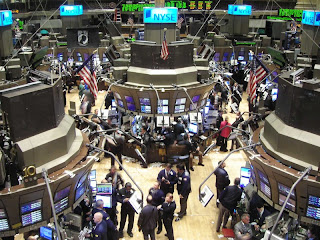Speculation in food futures is driving food prices up in third world countries, leading to revolutions that might bring extremists to power. Speculation in gas and oil has driven gas prices to almost $4 a gallon. What good are these speculators accomplishing? Shouldn't they be eliminated? Why pay higher prices that aren't justified...would it be so Goldman Sachs could maintain a healthy wealthy and wise status?
Goldman Sachs speculators set up a casino where the chips were the stomachs of millions. What does it say about our system that we can so casually inflict so much chaos and dissension into our global economy?
Until deregulation, the price for food was set by the forces of supply and demand for food itself. But after deregulation, it was no longer just a market in food. It became, at the same time, a market in food contracts based on theoretical future crops – and the speculators drove the price through the roof.
The Ed Shultz video is alarming at best, and depicts the evil that exist on Wall Street.
By now, you probably think your opinion of Goldman Sachs and its swarm of Wall Street allies has hit rock-bottomed at raw loathing. You're wrong. There's more. It turns out that the most destructive of all their recent acts has barely been discussed at all. This is the story of how some of the richest people in the world – Goldman, Deutsche Bank, the traders at Merrill Lynch, and more – have caused the starvation of some of the poorest people in the world and they unequivocally share a portion of blame in the revolutions currently storming the globe today.
Tunisia, Egypt, Yemen, these uprisings are just the beginning of an avalanche that shall escalate into a snowball that shall rival Biblical proportions.
This phenomenon known as the "food bubble" is not just a United States issue. Food speculation on Wall Street continues to starve millions. Get ready for a rocky year readers. From now on, rising prices, powerful storms, severe droughts and floods, and other unexpected events are likely to play havoc with the fabric of global society, producing chaos and political unrest. Start with a simple fact: the prices of basic food staples are already approaching or exceeding their 2008 peaks, that year when deadly riots erupted in dozens of countries around the world.
A new theory is emerging among democratic bloggers and economists. The same banks, hedge funds and financiers whose speculation on the global money markets caused the sub-prime mortgage crisis are known to be causing food prices to yo-yo and inflate. The charge against Wall Street are overwhelming and they are taking advantage of the deregulation of global commodity markets - they are making billions from speculating on food and causing misery around the world.
There has always been modest, even welcome, speculation in food prices and it traditionally worked like this. Farmer X protected himself against climatic or other risks by “hedging”, or agreeing to sell his crop in advance of the harvest to Trader Y. This guaranteed him a price, and allowed him to plan ahead and invest further, and it allowed Trader Y to profit, too. In a bad year, Farmer X got a good return but in a good year Trader Y did better.
When this process of “hedging” was tightly regulated, it worked well enough. The price of real food on the real world market was still set by the real forces of supply and demand.
But all that changed under Both Bush presidential regimes. Then, following heavy lobbying by banks, hedge funds and free market politicians in the US, the regulations on commodity markets were steadily abolished. Contracts to buy and sell foods were turned into “derivatives” that could be bought and sold among traders who had nothing to do with agriculture.
People die from hunger while the banks make a killing from betting on food, revolutions and chaos exist because dictators can't provide food to their citizens because food costs are too high.
These rising food prices serve as a powerful reminder that we humans are inextricably linked to our environment, and when it suffers, we suffer. It's also a reminder that development and environment issues cannot and should not be treated as separate. As Gawain Kripke, policy director for Oxfam America noted last week, unless we address both the underlying issues of both climate and development, "we will find ourselves perpetually on the knife's edge of disaster."
How much time do we have before the food bubble bursts? No one knows. If we stay with business as usual, the time is more likely measured in years than in decades. We are now so close to the edge, that politically destabilizing food price rises are at our global doorstep.
Once again, Wall Street and its team of diabolical frenzied money hoarders cause anarchy and ataxia amongst the masses. When will they really be held accountable?
Certainly the civil unrest in the middle East is due in part by the greed of Goldman Sachs. While unemployment and Dictatorships are contributing factors to the unrest and must be weighed in, but there is know doubt a hungry world is a angry world.
NFTOS



